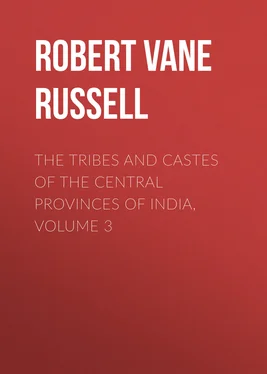Robert Vane Russell - The Tribes and Castes of the Central Provinces of India, Volume 3
Здесь есть возможность читать онлайн «Robert Vane Russell - The Tribes and Castes of the Central Provinces of India, Volume 3» — ознакомительный отрывок электронной книги совершенно бесплатно, а после прочтения отрывка купить полную версию. В некоторых случаях можно слушать аудио, скачать через торрент в формате fb2 и присутствует краткое содержание. Жанр: foreign_prose, История, foreign_edu, foreign_antique, на английском языке. Описание произведения, (предисловие) а так же отзывы посетителей доступны на портале библиотеки ЛибКат.
- Название:The Tribes and Castes of the Central Provinces of India, Volume 3
- Автор:
- Жанр:
- Год:неизвестен
- ISBN:нет данных
- Рейтинг книги:5 / 5. Голосов: 1
-
Избранное:Добавить в избранное
- Отзывы:
-
Ваша оценка:
- 100
- 1
- 2
- 3
- 4
- 5
The Tribes and Castes of the Central Provinces of India, Volume 3: краткое содержание, описание и аннотация
Предлагаем к чтению аннотацию, описание, краткое содержание или предисловие (зависит от того, что написал сам автор книги «The Tribes and Castes of the Central Provinces of India, Volume 3»). Если вы не нашли необходимую информацию о книге — напишите в комментариях, мы постараемся отыскать её.
The Tribes and Castes of the Central Provinces of India, Volume 3 — читать онлайн ознакомительный отрывок
Ниже представлен текст книги, разбитый по страницам. Система сохранения места последней прочитанной страницы, позволяет с удобством читать онлайн бесплатно книгу «The Tribes and Castes of the Central Provinces of India, Volume 3», без необходимости каждый раз заново искать на чём Вы остановились. Поставьте закладку, и сможете в любой момент перейти на страницу, на которой закончили чтение.
Интервал:
Закладка:
Go in the direction of the arrow; there you will get fire.
He applied the arrow, and having pulled the bow, he discharged one:
It crashed on, breaking twigs and making its passage clear.
Having cut through the high grass, it made its way and reached the old man’s place (above mentioned).
The arrow dropped close to the fire of the old man, who had daughters.
The arrow was near the door. As soon as they saw it, the daughters came and took it up,
And kept it. They asked their father: When will you give us in marriage?
Thus said the seven sisters, the daughters of the old man.
I will marry you as I think best for you;
Remain as you are. So said the old man, the Rikad Gawādi.
Lingo said, Hear, O brethren! I shot an arrow, it made its way.
Go there, and you will see fire; bring thence the fire.
Each said to the other, I will not go; but (at last) the youngest went.
He descried the fire, and went to it; then beheld he an old man looking like the trunk of a tree.
He saw from afar the old man’s field, around which a hedge was made.
The old man kept only one way to it, and fastened a screen to the entrance, and had a fire in the centre of the field.
He placed logs of the Mahua and Anjun and Sāj trees on the fire,
Teak faggots he gathered, and enkindled flame.
The fire blazed up, and warmed by the heat of it, in deep sleep lay the Rikad Gawādi.
Thus the old man like a giant did appear. When the young Gond beheld him, he shivered;
His heart leaped; and he was much afraid in his mind, and said:
If the old man were to rise he will see me, and I shall be eaten up;
I will steal away the fire and carry it off, then my life will be safe.
He went near the fire secretly, and took a brand of tendu wood tree.
When he was lifting it up a spark flew and fell on the hip of the old man.
That spark was as large as a pot; the giant was blistered; he awoke alarmed.
And said: I am hungry, and I cannot get food to eat anywhere; I feel a desire for flesh;
Like a tender cucumber hast thou come to me. So said the old man to the Gond,
Who began to fly. The old man followed him. The Gond then threw away the brand which he had stolen.
He ran onward, and was not caught. Then the old man, being tired, turned back.
Thence he returned to his field, and came near the fire and sat, and said, What nonsense is this?
A tender prey had come within my reach;
I said I will cut it up as soon as I can, but it escaped from my hand!
Let it go; it will come again, then I will catch it. It has gone now.
Then what happened? the Gond returned and came to his brethren.
And said to them: Hear, O brethren, I went for fire, as you sent me, to that field; I beheld an old man like a giant.
With hands stretched out and feet lifted up. I ran. I thus survived with difficulty.
The brethren said to Lingo, We will not go. Lingo said, Sit ye here.
O brethren, what sort of a person is this giant? I will go and see him.
So saying, Lingo went away and reached a river.
He thence arose and went onward. As he looked, he saw in front three gourds.
Then he saw a bamboo stick, which he took up.
When the river was flooded
It washed away a gourd tree, and its seed fell, and each stem produced bottle-gourds.
He inserted a bamboo stick in the hollow of the gourd and made a guitar.
He plucked two hairs from his head and strung it.
He held a bow and fixed eleven keys to that one stick, and played on it.
Lingo was much pleased in his mind.
Holding it in his hand, he walked in the direction of the old man’s field.
He approached the fire where Rikad Gawādi was sleeping.
The giant seemed like a log lying close to the fire; his teeth were hideously visible;
His mouth was gaping. Lingo looked at the old man while sleeping.
His eyes were shut. Lingo said, This is not a good time to carry off the old man while he is asleep.
In front he looked, and turned round and saw a tree
Of the pīpal sort standing erect; he beheld its branches with wonder, and looked for a fit place to mount upon.
It appeared a very good tree; so he climbed it, and ascended to the top of it to sit.
As he sat the cock crew. Lingo said, It is daybreak;
Meanwhile the old man must be rising. Therefore Lingo took the guitar in his hand,
And held it; he gave a stroke, and it sounded well; from it he drew one hundred tunes.
It sounded well, as if he was singing with his voice.
Thus (as it were) a song was heard.
Trees and hills were silent at its sound. The music loudly entered into
The old man’s ears; he rose in haste, and sat up quickly; lifted up his eyes,
And desired to hear (more). He looked hither and thither, but could not make out whence the sound came.
The old man said: Whence has a creature come here to-day to sing like the maina bird?
He saw a tree, but nothing appeared to him as he looked underneath it.
He did not look up; he looked at the thickets and ravines, but
Saw nothing. He came to the road, and near to the fire in the midst of his field and stood.
Sometimes sitting, and sometimes standing, jumping, and rolling, he began to dance.
The music sounded as the day dawned. His old woman came out in the morning and began to look out.
She heard in the direction of the field a melodious music playing.
When she arrived near the edge of her field, she heard music in her ears.
That old woman called her husband to her.
With stretched hands, and lifted feet, and with his neck bent down, he danced.
Thus he danced. The old woman looked towards her husband, and said, My old man, my husband,
Surely, that music is very melodious. I will dance, said the old woman.
Having made the fold of her dress loose, she quickly began to dance near the hedge.
9. Death and resurrection of Lingo
Then Lingo disclosed himself to the giant and became friendly with him. The giant apologised for having tried to eat his brother, and called Lingo his nephew. Lingo invited him to come and feast on the flesh of the sixteen scores of nīlgai . The giant called his seven daughters and offered them all to Lingo in marriage. The daughters produced the arrow which they had treasured up as portending a husband. Lingo said he was not marrying himself, but he would take them home as wives for his brothers. So they all went back to the cave and Lingo assigned two of the daughters each to the three elder brothers and one to the youngest. Then the brothers, to show their gratitude, said that they would go and hunt in the forest and bring meat and fruit and Lingo should lie in a swing and be rocked by their seven wives. But while the wives were swinging Lingo and his eyes were shut, they wished to sport with him as their husbands’ younger brother. So saying they pulled his hands and feet till he woke up. Then he reproached them and called them his mothers and sisters, but they cared nothing and began to embrace him. Then Lingo was filled with wrath and leapt up, and seeing a rice-pestle near he seized it and beat them all with it soundly. Then the women went to their houses and wept and resolved to be revenged on Lingo. So when the brothers came home they told their husbands that while they were swinging Lingo he had tried to seduce them all from their virtue, and they were resolved to go home and stay no longer in Kachikopa with such a man about the place. Then the brothers were exceedingly angry with Lingo, who they thought had deceived them with a pretence of virtue in refusing a wife, and they resolved to kill him. So they enticed him into the forest with a story of a great animal which had put them to flight and asked him to kill it, and there they shot him to death with their arrows and gouged out his eyes and played ball with them.
Читать дальшеИнтервал:
Закладка:
Похожие книги на «The Tribes and Castes of the Central Provinces of India, Volume 3»
Представляем Вашему вниманию похожие книги на «The Tribes and Castes of the Central Provinces of India, Volume 3» списком для выбора. Мы отобрали схожую по названию и смыслу литературу в надежде предоставить читателям больше вариантов отыскать новые, интересные, ещё непрочитанные произведения.
Обсуждение, отзывы о книге «The Tribes and Castes of the Central Provinces of India, Volume 3» и просто собственные мнения читателей. Оставьте ваши комментарии, напишите, что Вы думаете о произведении, его смысле или главных героях. Укажите что конкретно понравилось, а что нет, и почему Вы так считаете.












